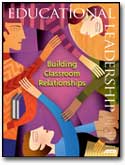“Schools may add parents to the punishment,” the headline proclaimed (Ortiz, 2003). The news story told of a district's proposal to intentionally embarrass students into good behavior at school. Students who disrupted or skipped class would have their parent invited to attend classes with them for a day. When told of the plan, 14-year-olds reacted with fury, one describing the idea as one of the top five worst things imaginable.
* * *
Flash backward in age to a class of preschoolers described in Vivian Gussin Paley's recent book (2001). In this classroom, the teachers have abolished the time-out chair. The idea evolved from Wally, who, after knocking down all the other kids' block towers, was sent to take time-out by his angry teacher. Later, when dictating a story to her, the morose Wally told about a dinosaur who knocked down a city and was sent to jail. His teacher understood the connection, and asked all the children to act out this story.
The story has a happy ending, for the dinosaur and Wally. The dinosaur was released from prison and went home to where his mother was waiting. After acting out Wally's story, all the other children wanted to tell—and have the others role-play—their stories. Thus began Paley's practice of children's theater, which involves asking kids to dictate a story about what is uppermost on their minds and then, through pretend play, join with others in thinking about the story's meaning.Eventually I eliminated the time-out chair. . . . Its existence pulled us apart whereas theater brought us together. . . . [The time-out chair] interfered with our faith in the effectiveness of rational solutions between people of goodwill. “Do this—or else!” is, simply put, not as reasonable to a child's ear as “Once upon a time there was a dinosaur and he was having a big problem.” (p. 49)
* * *
Reading about these two different approaches to student discipline, I was struck with, first, how much a student's attitude toward parents can change in 10 years. The 4-year-old sees his mom as the rescuer and the 14-year-old thinks “gigantic humiliation.” Of course, this is old news to any parent of a teenager. Second, I wondered whether the mandated parental visit to school has a chance of working. It sounds good—as does the time-out chair—sometimes. But think of the angry parents whose work schedules and child-care plans would be disrupted. According to a recent Brookings Institution study (reported by Olson, p. 9), one-fourth of parents of adolescents who were surveyed said that they had not spoken to any of their child's teachers in the past year. Is adding parents to school punishment really the answer? And think of the other students who watch their classmate's embarrassment. What message does this send to students about parents' involvement at school?
On the other hand, some adults may see dramatic theater as good for only the youngest children, whose misbehavior is often caused more by mistakes in judgment than by intention. Also, listening to every child's story every day takes a great deal of time, time that seems to get shorter as students advance through elementary, middle, and then high school. The Brookings study reports that although 60 percent of 7th graders believe that their teachers care about them, only 45 percent of 9th graders feel that way. Do teachers have the time to build relationships with their students?
This issue considers the many approaches to managing classrooms. The continuum ranges from punishment, control, manipulation, and rewards, to respect and relationships. Interestingly, the research (see Marzano & Marzano, p. 6) suggests that showing respect and building relationships have far more lasting effectiveness than do the more controlling practices. So the idea is to act with thoughtfulness, kindness, patience, tolerance, and understanding toward students, even when they act thoughtlessly, unkindly, impulsively, intolerantly, and insensitively. Although it works, no one says it's easy. But all of us know that the more coerecive ways aren't easy either.

